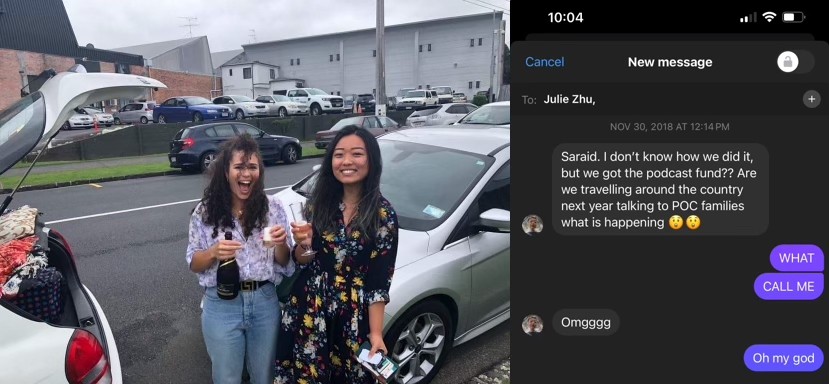INFO
| Name | Conversations with My Immigrant Parents |
| No. of Seasons | 3 |
| Presenter | Saraid de Silva and Julie Zhu |
| Producer(s) | Saraid de Silva and Julie Zhu |
| Artform | Podcast |
ABOUT
Conversations with My Immigrant Parents is a podcast and docu-series created by Saraid de Silva and Julie Zhu for RNZ. Each 40-60 minute podcast episode focuses on a family in Aotearoa, exploring their life and intergenerational dynamics as they relate to issues like migration, religion, mental health, sexuality, gender, parenting, grief, language, love, health, and more. Three seasons have been produced, with episodes sharing the stories of families from countries including Zimbabwe, Cambodia, Argentina, Holland, Pakistan, Tonga, the Philippines, Sri Lanka, Palestine, Korea, Botswana, Samoa, Fiji, Brazil, and Vietnam.
Zhu and de Silva have said, “We made the podcast out of a motivation to connect more with our own immigrant whānau too, wanting to open up discussions that really hadn’t been given the time, from either generation. For Saraid, this came about from speaking to her mum about the ways being Sri Lankan has affected her life and her experience of whiteness in Aotearoa. For Julie, it came out of long-held blocks in communication built across language barriers and internalised racism.”
Each episode features excerpts from conversations between family members, largely presented in a fly-on-the-wall style, allowing the dialogue to flow organically. Reflections from Zhu and de Silva are recorded later and inserted throughout the episode — these sometimes draw out larger themes and observations about family dynamics and migrant stories, or recount details of the time they spent with each family in the lead-up to, and during, recording. Often the pair spend a couple of days with the family, sharing meals, recording, and sometimes even staying with them. Behind-the-scenes photographs are frequently shared on the podcast’s Instagram page.
To record the podcast, Zhu and de Silva travel around Aotearoa, visiting each family at home, which creates an environment where families feel comfortable and lends the episodes an intimacy they may not otherwise have if they were recorded in a studio. Zhu and de Silva have held open calls to connect with families who might be interested in being featured on the podcast. In some episodes, the conversations take place in English; in others, they are held in the participants’ mother tongues, with a translator present so that both languages are represented.
The first season was recorded in 2019, the same year as the March 15 terrorist attacks in Ōtautahi Christchurch, and Zhu and de Silva have often framed the podcast in the context of this event, saying:
A lot of the desire to make the podcast also stemmed from seeing how thinly veiled the expression of white supremacy is in this country, historically and presently, but how reluctant as a nation we are to readily acknowledge and dismantle this. We wanted to offer nuanced stories and experiences of how the systemic marginalisation of migrants in Aotearoa hurts all of us, and how we can actively work against that.
One of the themes that emerges across the series is that of children coming to accept their parents’ cultural outlooks by gaining a greater understanding of their lives. Responding to episode 7 of season 1, writer and performer Sarita So said, “I hear through the episode possible misunderstandings between the family members, the wanting to make sense of how their lives have unfolded, and the desire now to connect. This is why I hold on so tight to my relationship with family, history, trauma and the beauty of where I came from.”











